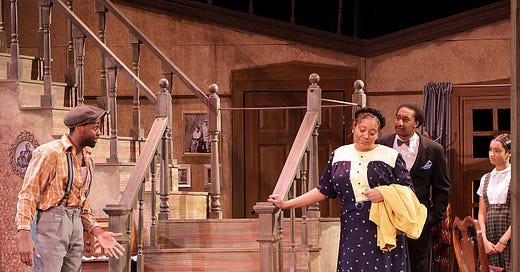The Pyramid Theatre Company’s vision is one of captivation.
“The ancient pyramids were often polished in order to reflect the light from the sun and moon. This reflection could be seen from miles away. Adherence to these principles will establish and sustain Pyramid Theatre Company as a well-polished company that attracts audiences from miles away.”
The idea of theater takes most of us to the illuminating lights of Broadway; the glitzy marquees naming world-renowned stars whose vocal power fills every inch of historical theaters. Stepping into a Broadway performance is like stepping into another world, Old Hollywood glitz and glamour, art and power enveloping you.
It’s another level of special when local and regional theater envelops you in the same way.
I felt the warmth of a powerful piece of theater last week when I attended a performance of August Wilson’s Pulitzer Prize-winning “The Piano Lesson” put on by The Pyramid Theatre Company at the Des Moines Community Playhouse.
The Pyramid Theatre Company is a Des Moines-based theater company dedicated to “illuminating the presence of Black artists in the theatre canon and
providing a means of artistic expression to emerging Black voices.” This particular performance represented a sort of coming home for the company - directed by the Company’s co-founder Ken-Matt Martin, who now directs plays across the country, the opening performance occurred 10 years after the company’s opening performance of “Fences,” another August Wilson production.
The Piano Lesson is a story of how we pass on experiences from generation to generation. A Black family argues over the future of the family piano, beautifully carved by their enslaved ancestors. Boy Willie wants to sell the piano and use the money to buy back the land those enslaved ancestors worked; his sister Berniece wants to keep it to continue honoring their family. Family bickering, shared traditions, spiritual experiences - this piece explores the relationship between our past and present, the nuances in navigating institutions of oppression, how we handle the raw truth of our own stories.
Set in the late 1930s in Pittsburgh, I was in awe of the set design when I walked into the theater. Set designer Sydney Lynne took particular care in ensuring the setting pulled the viewer into the story; from the early 20th century kitchen equipment to the tiny black and white photos of family members hanging on the wall, I felt that if I were to walk on the stage I would walk straight back in time.
Tiffany Johnson - a founding member of the Pyramid Theatre Company and current Artistic Director - played Berniece with a controlled power, a woman dedicated to familial care, resolute in her aims and steadfast as she keeps one foot in the past and one foot in the now. Her voice was strong, the type that stops a child in their tracks as they sneak a cookie from the kitchen.
Johnson was in perfect juxtaposition with Emmett Phillips’ Boy Willie, the fast-talking, big dreaming brother who refuses to back away from what he wants. Phillips kept an astounding pace of energy the entire three hour play, clapping and stomping around the stage as Boy Willie conspired to get his way. The glare from Johnson plus the bright smile from Phillips created a dynamic sibling relationship that felt both uneasy and familiar.
Johnson shared the why behind her love of acting in her playbill bio:
“Acting has always been a passion of hers as she feels it gives her a unique opportunity to ask tough questions, raise awareness of issues, and many times walk right up and touch the elephant in the room.”
It felt like there were several tough questions being asked in this play. What do we owe the relics of our past? What are we holding onto when we refuse to let go? How do we decide what we consider valuable? How do we respect what others value when it’s in direct opposition to our own goals?
Then there is the symbolic elephant in the room, the elephant that I can’t begin to understand as a white woman. How is intergenerational trauma inherited? How does it transform as we move further away from the event? What does true justice for the harms of the past look like?
We can look these questions in the face through art. Art takes the human experience and examines it from every vantage point. Art invites a person to let go of any bias to attempt to connect with an other. Art has the inherent ability to illuminate the nuances of living, the complexity of answers for simple questions.
The importance of a company like the Pyramid Theatre Company operating in Iowa cannot be understated here. This state is 4.1% Black. People who look like me cannot gain insight into the life of a Black Iowan by sitting in our living rooms and watching TV, or talking with other white people, or going to our jobs and never thinking about someone else’s experience. We can find some insight from plays like The Piano Lesson, from holding space for Black voices while quieting our own, from not only hearing Black stories but absorbing them, supporting them, internalizing their truths. From supporting institutions like the Pyramid Theatre Company that are working to move the spotlight to those who historically have been pushed to the shadows.
My coworkers and I went to The Piano Lesson to support Phillips, who is a CultureALL Ambassador. When I congratulated him on an excellent performance, he told me the play encompassed everything he wants to do in building community and using art as a way to work towards justice. His work with CultureALL involves facilitating workshops that explore the concept of art as activism and illuminate the ways racism operates in our society. He uses acting, poetry, and music to demonstrate to youth the issues we face today, and the solutions that live in tomorrow. He reminded me in that moment that when you dedicate your life to art, the illumination will never stop.
The Midwest Creative is a proud member of the Iowa Writers Collaborative. Please consider subscribing to some of my colleagues.







My wife and I also attended one of the performances, and were so glad we did!